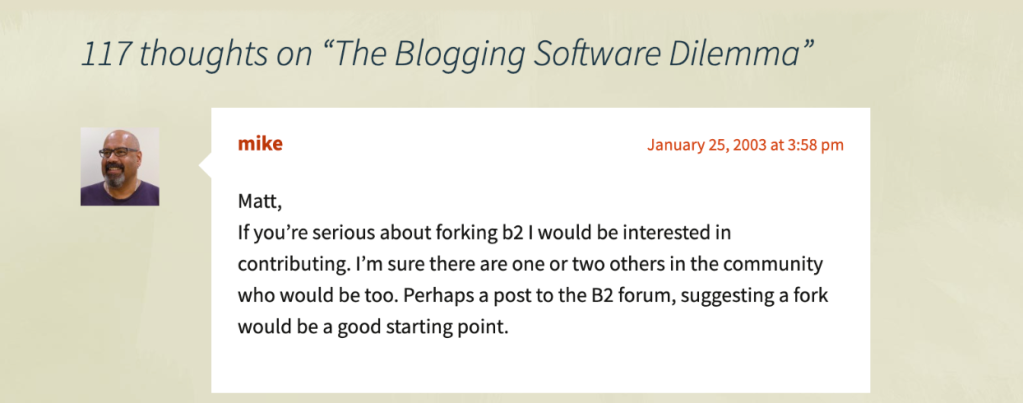Above: Watch Matt Mullenweg, Mike Little, and Dries Buytaert — in conversation for the first time ever — discuss 20 years of WordPress as well as the future of open source.
On May 27, 2003, co-founders Matt Mullenweg and Mike Little announced that WordPress was available to the public. Their vision, as you can still read in their original post on WordPress.org, was to foster a means by which anyone could easily share and discuss their ideas with the world.
What started as a humble open-source blogging platform is now the driving force behind over one-third of the internet’s most popular websites, including The New York Times, Salesforce, and Disney. But the non-profit WordPress project continues to further its mission of democratizing publishing for the entire world. Just as Version 0.7 was available as a free download under the General Public License (GPL) 20 years ago, WordPress remains free today — at Version 6.2 and counting.
The original comment from WordPress co-founder Mike Little, which kickstarted the creation of a platform that would change the internet forever.
Automattic — the parent company of WordPress.com, Jetpack, Tumblr, and other web platforms and services — didn’t yet exist when Mike and Matt launched WordPress. But since its birth in 2005, the two organizations have worked hand in hand. Through the Five for the Future initiative, Automattic commits 5% of our company’s resources — including over 4,000 employee hours per week — to the open source WordPress project. In turn, we benefit from the amazing work they do in improving WordPress and ensuring the best possible experience for building and maintaining your website, no matter how small or large.
It’s a symbiotic relationship for which we have a deep appreciation. The WordPress community often uses a saying that we love: “A rising tide lifts all boats.” A healthy and thriving WordPress project benefits all of us.
So, to our friends in the WordPress open source community, we extend a heartfelt congratulations and thank you. Happy 20th anniversary! We can’t wait to see what the next two decades — and beyond — will bring.
Quelle: RedHat Stack









